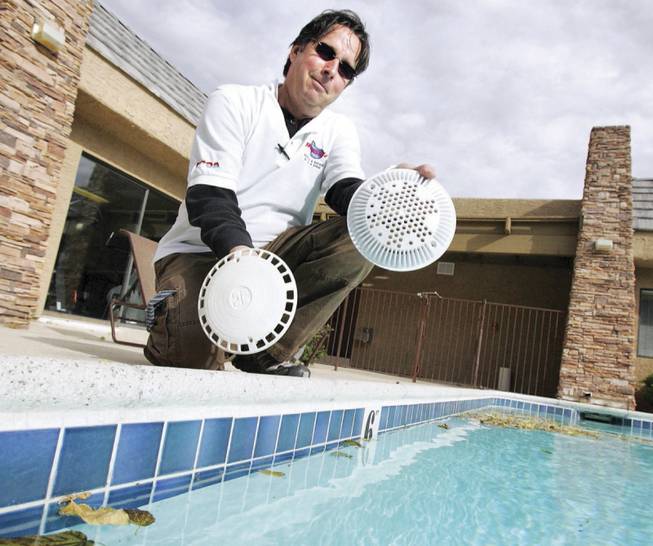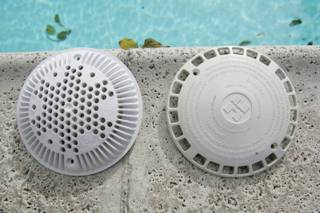
Mike Heiney, owner of Westside pools, compares an old pool drain cover, left, with a new anti-entrapment cover designed to prevent death. Federal law requires that public and community pools and spas have the drain covers installed, which Heiney calls “an expensive process.”
Monday, March 30, 2009 | 2 a.m.
Prompted by drownings of youngsters pulled to the bottom of swimming pools by the overpowering suction of pool filters, including the death of the 7-year-old granddaughter of former Secretary of State James Baker, Congress in 2007 passed a law requiring that public and community swimming pools and spas be retrofitted with safety devices.
The law went into effect in December. But scores of homeowner associations across the Las Vegas Valley have yet to do the work and are telling their members not to count on enjoying their pools this summer.
Some of the associations say they don’t have the money. With so many foreclosures, their income from homeowners dues has plummeted.
The managers of other homeowner associations that can afford the retrofitting say they won’t be opening their pools for other reasons. They blame confusion over conflicting federal and state laws, a paucity of parts and a backlog of requests at the Southern Nevada Health District to sign off on the retrofits.
Association managers say their clients sympathize with the intent of the law but are frustrated in trying to comply with it.
“I don’t want to worry about my children’s hair getting stuck,” says Jamie McCafferty, owner of Excellence Community Management, which operates about 150 HOAs valleywide. “And obviously it’s a hazard. But it’s a difficult time to do this; it’s been hard on HOAs with all their defaults.”
Mary Bolchalk of Adept Property Management expects that three of her 30 HOAs won’t have a pool operational this summer. (The law extends to hotel and municipal pools, but not those at private residences. About 4,200 pools valleywide are affected by the federal act).
Retrofitting can cost upward of $40,000 but averages about $5,000, according to contractors and health officials.
The average cost isn’t a pittance to aging developments with fewer than 100 units. Donna Barbee, a regional vice president of Griswold Real Estate Management, says two of her communities almost certainly won’t open their pools this summer.
“I’ve got residents asking for refunds,” Barbee says. “We don’t know if we’ll be able to do that. And if we raise dues higher, I’ll have more homes in foreclosure.”
One of the associations Barbee manages, near Wynn Road and Twain Avenue, hosts a pool for a community with 200 units, but only 48 were built. The bill for a pool that size would run $14,000, Barbee says. So she tried to secure loans, but the association of 900-square-foot townhouses has a high delinquency rate. If she can even get a loan, it will carry a high interest rate.
Bolchalk assumes that most people in these poorer HOAs can’t afford a vacation this year, even to the California coast. “So they’ll expect to use their facilities, but they might not,” she says.
The extent of pool-less HOAs could have been worse valleywide, at least at the start of summer: The shortage of drain supplies has eased since last month, pool contractors say, and concern over compliance with the law has eased somewhat.
The federal Consumer Product Safety Commission enforces the Virginia Graeme Baker Pool and Spa Safety Act — not the Southern Nevada Health District or a state agency.
That initially proved problematic: the health district may not enforce the law, but its staff must issue work permits and approve any pool rehabilitation. So there’s a a growing backlog of approval requests, even with the earlier shortage in drain supplies. Some managers blame former district officials for failing to prepare for this summer upon the bill’s approval. Other managers acknowledge they share in the blame. They say they’ve known about the new law since early 2008, but the deepening recession delayed their own timeline until recently, overwhelming pool contractors and district officials.
The health district recently tweaked its approval process, allowing HOA managers to reopen their retrofitted pools without an inspection. If an inspector later identifies a problem, the pool will be closed to address it, says Glenn Savage, an environmental health director for the health district.
The district’s procedural change has pleased informed HOA managers, but several still are unclear about the details. Some managers are unaware that legal verification of the new approval process is available on the health district’s Web site.
And contractors say there is an inconsistency between the federal and state laws: Some safer drain covers are so thick they may not comply with state law because they can stub toes, says contractor Joe Blockovich. But a health district spokeswoman says federal law trumps state code, so the shape of drain covers shouldn’t halt the retrofitting.


Join the Discussion:
Check this out for a full explanation of our conversion to the LiveFyre commenting system and instructions on how to sign up for an account.
Full comments policy